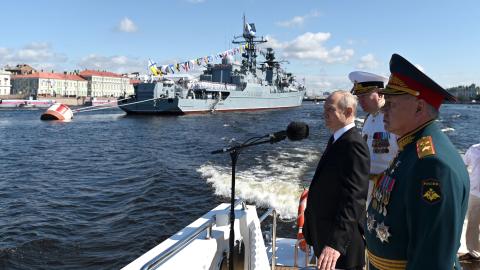“Odesa, come back home. We have longed for Odesa in the Russian Federation, because of the city’s history, the people who live there, and the language they speak. This is our Russian city.”
While most eyes are focused on the Donbas, ex-Russian president Dmitriy Medvedev’s February 22 comment is another reminder—as if more were necessary—of the nature of Kremlin ambitions in Ukraine. Some may consider a statement like this bombastic and unrealistic. Yet, when Russian leaders tell us what they want, we should not ignore them, as has happened so often in the last several decades.
Odesa is the most important and well-known city on Ukraine’s Black Sea coast, with a population of 1 million. Founded in 1795 by Empress Catherine the Great on the site of the ancient Greek colony Odessos, Odesa is also the capital of the region that includes the ports of the cities of Odesa, Yuzhne, and Chornomorske. Ukraine exported 65 percent of its grain through these ports before the war, as well as through the smaller ports of Bilhorod-Dnistrovskyi (near the mouth of the Dniester) and Ust-Dunais’ke.
The Danube ports of Izmail and Reni complement the strategic port infrastructure of the Odesa region. When Russia imposed a naval blockade on Ukrainian ports in the Black Sea, only Reni and Izmail remained able to export the country’s grains to global markets. Romanian ports on the Danube, especially Sulina and Constanta on the Black Sea, became alternative routes for Ukraine’s exports, which Bucharest hopes will soon account for 60 percent of Ukraine’s grain exports. In the early months of the war, Romania transited 300,000 tons of cereals. By October 2023, it increased transit to three million tons per month, owing to its massive logistical and financial efforts.
At the Russian naval blockade’s peak—from February to July 2022—Ukraine lost $170 million per day. The savage bombing of ports on the Black Sea and the Danube, as well as the use of mines, blockades, electronic warfare, and abusive inspections of ships to disrupt maritime communications and GPS, are all part of Russia’s strategy to undermine Ukraine’s economy and freedom of navigation in the Black Sea. Without viable Black Sea ports, Ukraine’s economy will suffocate. Putin regularly reminds us that he wants to destroy Ukraine, but that is much more difficult if Ukraine has access to the sea. Having occupied the Azov Sea littoral, it is difficult to imagine that Russia will not try again to occupy more of Ukraine’s Black Sea littoral—with Odesa as the prize.
Medvedev was simply reiterating Putin’s reference, in his annual televised dialogue on December 14, to Odesa as a Russian city and to Ukraine’s southeastern region as “Russian lands.” A video is circulating on Russian social media in which a Russian soldier explains that he voted for Putin because “our president considers Odesa as a Russian city, and I’m from Odesa.”
We must consider what Russian leaders say and how they remember their history. Catherine the Great used to say that the only way for Russia to protect its borders was to expand them. For centuries, war has been part of the Russian raison d’etat, always eager for new territories and resources to consolidate Moscow’s power without modernizing the country.
Odesa is not just any city. Since the days of the Russian Empire, its residents have thought themselves unique. A cosmopolitan, multi-ethnic city that retains its nineteenth-century architectural charm despite suffering greatly in the Second World War, Odesa also serves as an important maritime and commercial center.
Beyond Odesa is the mouth of the Danube, Transnistria, and the rest of the Republic of Moldova between the Dniester and the Prut rivers. If the Russian army crosses Odesa, there is nothing to stop it until the Romanian border. The Danube in Russian hands would be a geostrategic nightmare for Romania, a vital U.S. ally that feels directly threatened by the Russians, particularly now that it shares a maritime border after Putin seized part of the Ukrainian Exclusive Economic Zone.
The Danube Delta is full of lakes and marshes with few inhabitants. Many are Lipovans—ethnic Russians who settled in Romania in the seventeenth and eighteenth centuries. Will we soon see Russian Spetsnaz troops infiltrating the Sulina Canal to sabotage trade or take similar actions?
The Moldova-Transnistria Angle
The Republic of Moldova—whose southern tip is about one-and-a-half miles from the Dniester estuary that connects to the Black Sea—could face a coup, as Russia would prefer a client regime over the current democratic and pro-Western government. Putin could orchestrate false-flag actions or incidents in Russian-occupied Transnistria or the south of the country (such as the Gagauzia region, where a majority of the population has a positive view of Russia and Putin) as a pretext for direct military intervention. Would Putin again expect a freeze of the conflict and negotiations with U.S. or European leaders? These scenarios are of renewed relevance given recent calls in Transnistria for “protection” from Russia.
Russian Foreign Minister Sergei Lavrov’s threatening statements at the Antalya Diplomacy Forum in Turkey on March 2 presage continuing Russian hybrid actions against the Republic of Moldova while shaping a rationale for taking control of the country.
Lavrov’s argument that Moldova is discriminating against Russian-speaking minorities was the rationale Putin deployed against Ukraine. Secondly, more than 200,000 inhabitants of Transnistria have Russian citizenship, a fact that Moscow could use to justify military intervention according to the Russian Constitution and military doctrine. Thirdly, Lavrov accused Moldovan leaders of being under Romanian influence and seeking unification, reiterating the narrative of Western meddling that Putin used against Ukraine.
Lavrov made these statements on the same day the pro-Russian governor of the Gagauzia region visited Moscow. New destabilizing actions in Moldova can be expected in view of presidential elections in November, in which pro-EU President Maia Sandu could be re-elected.
A Repeat of Donbas?
If Russia were to seize Odesa and/or parts of the rest of the Ukrainian littoral, we could expect a repeat of the Donbas: a formal annexation of newly occupied territories, staged referenda—as in the Kherson, Zaporizhzhia, Donetsk, and Luhansk regions—and similar occurrences of terror, torture, and ethnic cleansing.
To prevent this from happening, Ukraine needs urgent support to resist increasing Russian pressure on the front and to defend itself against such scenarios. Pressure will increase after Putin’s guaranteed victory in the March 15–17 presidential “elections.”
After that, we can expect war to become Putin’s exclusive preoccupation, obsessed as he is with restoring “Russian greatness” via conquest and securing his place in Russian history. We must be aware that in the broad sweep of history, Russians considered Peter and Catherine as “great” not for any particular reforms they introduced but for the territories they conquered and the borders they extended.
Putin has not surrendered his goal of taking Odesa. Gaining access to the mouth of the Danube is not an impossible objective. While all eyes are on the Donbas, it is essential to keep Putin’s additional priorities in Ukraine in mind, however far-fetched they may seem in the present. Continued U.S. support is vital to assist Ukraine in resisting Putin’s onslaught. He must be stopped before Odesa lest he continues further west along the Black Sea littoral.


















